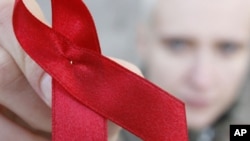The focus for World AIDS Day this year is the importance of science in the fight against AIDS. And 2011 finds researchers increasingly optimistic about the prospects of preventing, treating - and someday - even curing AIDS. That's why a group of researchers has written an open letter to the leaders of the United States and others nations, encouraging them to redouble their efforts toward fighting AIDS, even during the current global economic downturn.
2011 saw some important scientific advances. One study, for example, found early treatment of HIV-positive people with anti-retroviral drugs can greatly reduce transmission of the virus to an uninfected sexual partner. Infectious disease specialist Myron Cohen, from the University of North Carolina, designed the two-year trial: HIV Prevention Trials Network 052.
"We were looking at couples where one was positive and the other was negative. And when we treated the infected person, we rendered them essentially non-contagious during the course of the study," Cohen said. "In addition, we saw benefit to personal health. There were fewer cases of tuberculosis among people who started therapy earlier."
But with the world economic situation, financial support for public health research and assistance is waning. For the first time, the Global Fund to Fight AIDS, malaria and tuberculosis had a budget shortfall.
Cohen said cuts to funding will especially hurt the countries hardest hit by AIDS, and fewer research dollars will slow progress aimed at developing better drugs and a possible vaccine. That's a mistake, he said.
"We're not done with science…" Cohen said. "You know, we got this far with science. Making a vaccine and curing AIDS is going to require another generation of scientists. So, I think we have no choice but to redouble our efforts right now, which I hope we can do."
Cohen said that in wealthier countries, HIV infection has become a chronic disease, and that could be the situation worldwide, provided treatment remains available. He believes more effective ways of preventing the disease soon will be possible, as well.
That's why he and dozens of others signed an open letter from the Infectious Diseases Society of America encouraging future funding and praising a recent speech by U. S. Secretary of State Hillary Clinton.
"I don't know if I've ever heard a speech from a political leader so detailed, so she provided her own view of the details that was both creative and accurate," Cohen said about the speech given at the U.S. National Institutes of Health. "She [Clinton] talked about our need to combine prevention efforts, based on the science that has developed and when you put it together in a package. She laid out an aspiration -hope for an 'AIDS-free' generation."
Cohen saw his first patient with HIV in 1981, and has been working to fight HIV and AIDS since. He remembers when HIV was a death sentence and said he hopes he'll see an AIDS-free generation before his career is over.
However, that can only happen, Cohen insists, if strong research efforts continue.
Researchers Cite Progress Toward HIV Treatment, Cure
- By Rose Hoban




